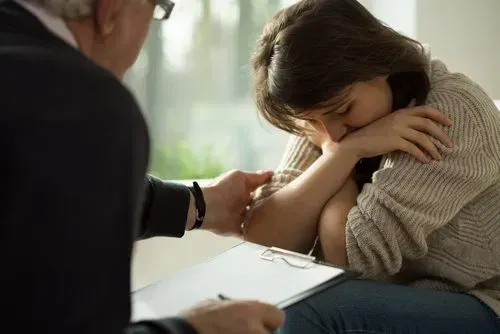Gambling Addiction
in Lexington, Richmond & Frankfort KY
What is Gambling Addiction?
Gambling can be defined as betting something of value when the outcome is uncertain. Gambling occurs in many forms, including: lotteries, casinos (slot machines, table games), bookmaking (sports books and horse books), card rooms, bingo, and pari-mutuels (horse and dog tracks, off-track-betting, Jai Alai). Gambling stimulates the brain's reward system similar to drugs and alcohol, potentially leading to addiction. Pathological or Compulsive Gambling is identified as an impulse control disorder that prompts the uncontrollable urge to keep gambling despite the toll it takes on your life. Although treating compulsive gambling can be challenging, many compulsive gamblers have found help through professional treatment.
Signs & Symptoms
Compulsive gambling affects the gambler, their family, their employer, and the community. As the gambler goes through the phases of their addiction, they spend less time with their family, spend more of the family's money on gambling until the bank accounts are depleted, and then may steal money from family members. At work, the pathological gambler misuses time in order to gamble, has difficulty concentrating and finishing projects, may show abnormal mood swings, and may engage in embezzlement, employee theft, or other illegal activities. The gambler, in desperation, may experience hopelessness, leading to suicidal thoughts, arrests, and divorce.
Signs and symptoms of compulsive gambling include:
- Gaining a thrill from taking big gambling risks
- Taking increasingly bigger gambling risks
- Preoccupation with gambling
- Reliving past gambling experiences
- Gambling as a way to escape problems or feelings of helplessness, guilt or depression
- Taking time from work or family life to gamble
- Concealing or lying about gambling
- Feeling guilt or remorse after gambling
- Borrowing money or stealing to gamble
- Failed efforts to cut back on gambling
For many compulsive gamblers, betting is not as much about money as it is about the excitement. Sustaining the thrill that gambling provides usually involves taking increasingly bigger risks and placing larger bets.
Diagnosis & Treatment Options
Treating compulsive gambling can be challenging, partly because most people have a hard time admitting they have a problem. A major part of treatment is working on acknowledging that you are a compulsive gambler.
Treatment for compulsive gambling involves three main approaches:
- Psychotherapy.
Psychological treatments, such as behavior therapy or cognitive behavioral therapy, may be beneficial for compulsive gambling. Behavior therapy uses systematic exposure to unlearn gambling and to learn skills to reduce the urge to gamble. Cognitive behavioral therapy focuses on identifying unhealthy, irrational and negative beliefs and replacing them with healthy, positive ones.
- Medications.
Antidepressants, mood stabilizers, and narcotic antagonists may help treat problems that often go along with compulsive gambling, such as depression, obsessive-compulsive disorder or attention deficit hyperactivity disorder, but not necessarily compulsive gambling itself.
- Self-help groups.
Some people find self-help groups, such as Gamblers Anonymous, a helpful part of treatment.
There Is Hope!
The appeal of gambling is hard to overcome if you keep thinking that you'll win the next time you gamble. These recovery skills may help you remain focused on resisting the urges of compulsive gambling:
- Tell yourself it's too risky to gamble at all. One bet typically leads to another and another.
- Give yourself permission to ask for help, as part of realizing that sheer willpower isn't enough to overcome compulsive gambling. Ask a family member or friend to encourage you to follow your treatment plan.
- Stay focused on your No. 1 goal: not to gamble. Coping skills to better manage the other issues in your life can be initiated only when you aren't gambling.
- Recognize and then avoid situations that trigger your urge to bet.
There's no proven way to prevent a gambling problem from occurring or recurring. If you have risk factors for compulsive gambling, get treatment at the earliest sign of a problem to help prevent a gambling disorder from becoming worse. Visit these websites or set up an appointment today for more information about gambling addiction.
New Client Info
Lexington, KY
Darby Creek Location
501 Darby Creek Road
Suite 11
Lexington KY, 40509
Phone:
859-338-0466
Fax:
859-294-0802
All Locations
LIST
MAP
- Darby Creek Lexington, KY 501 Darby Creek Road, Lexington, KY, United States
- Duval Street Location Lexington, KY 1092 Duval Street, Lexington, KY, United States
- Frankfort, KY 105 Diagnostic Dr, Frankfort, KY 40601, United States
- 1043 Center Dr, Richmond, KY 40475, United States 1043 Center Dr, Richmond, KY 40475, United States
Recent Posts
What is therapy?
Therapy is more long-term than counseling and focuses on a broader range of issues. The underlying principle is that a person's patterns of thinking and unconscious awareness affect the way that person interacts with the world. The goal is to uncover those patterns and become aware of their effect and then learn new, healthier ways to think and interact.








